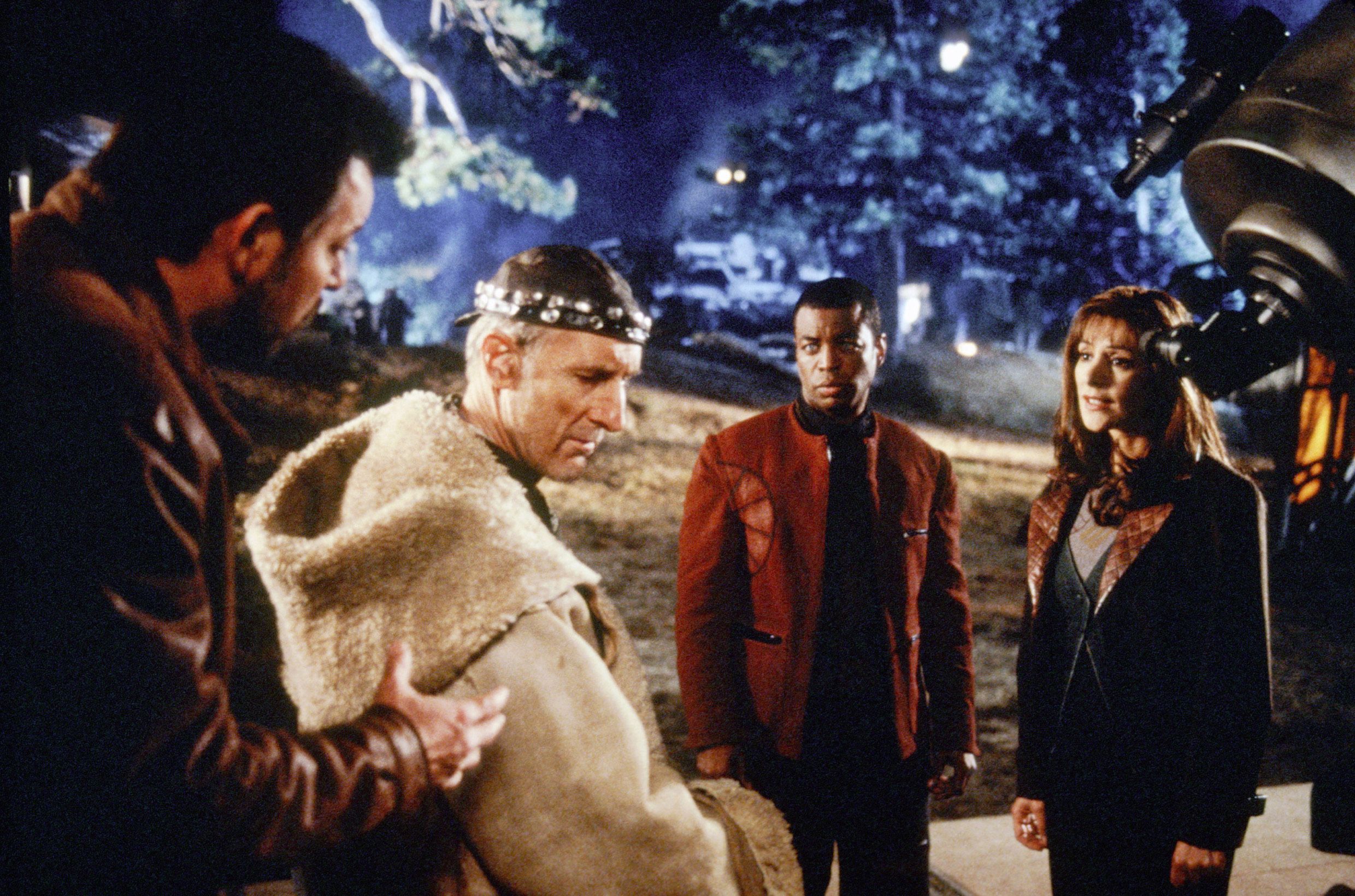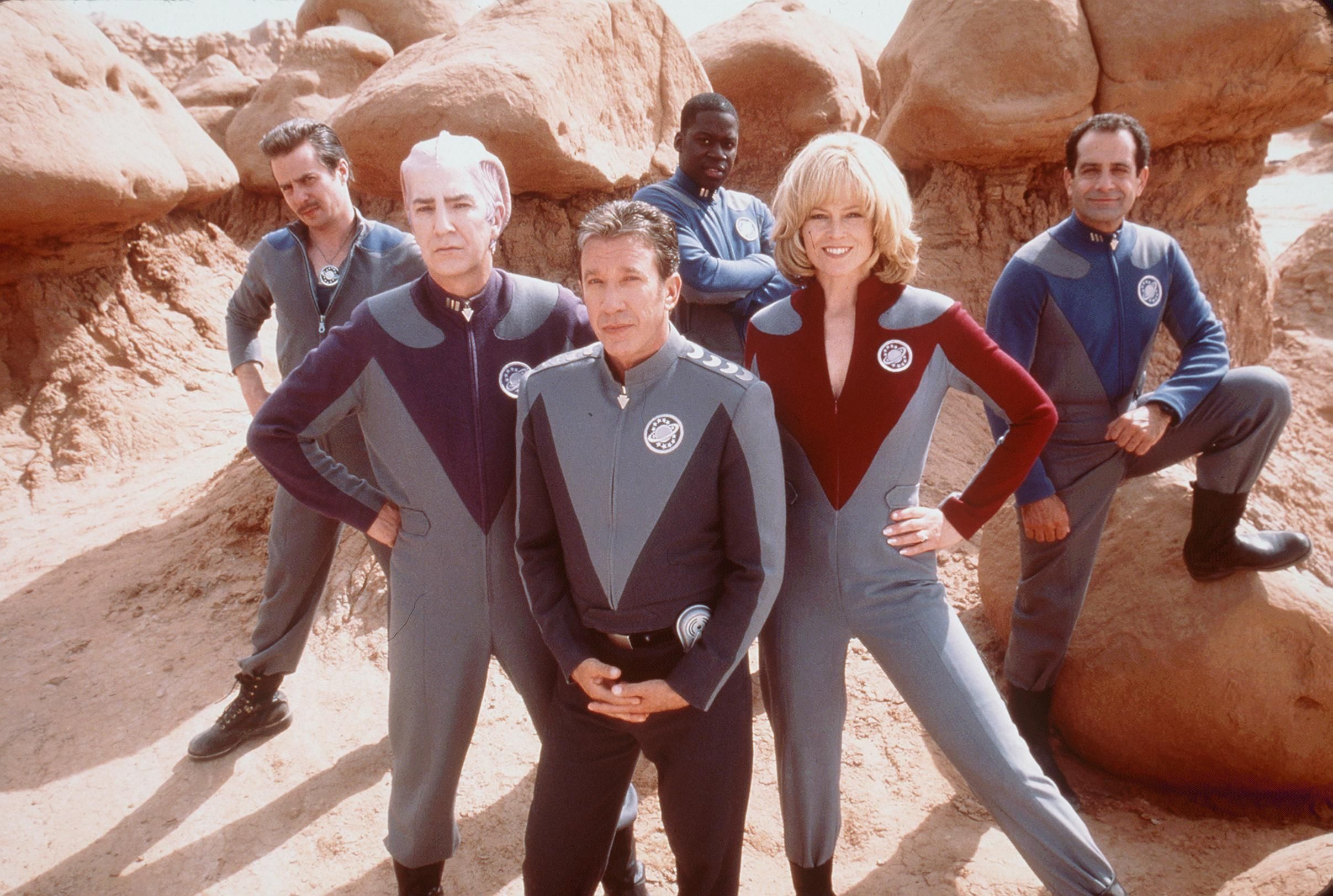While everyone knows Jonathan Frakes for his work as William T. Riker on Star Trek: The Next Generation, what you might not realize is TNG opened the door to his true love: directing. After paying his dues behind-the-scenes by studying how TNG was made, Frakes assumed a new role in the director's chair for Season 3's "The Offspring." With the success of that episode, Frakes was allowed to direct more episodes of TNG, followed by episodes of Star Trek: Deep Space Nine and Star Trek: Voyager. After helming over a dozen episodes between the three series, Frakes landed his first movie: Star Trek: First Contact. From there he directed more movies (including Star Trek: Insurrection) and has spent the last decade and a half helming a number of TV shows including Star Trek: Discovery, Star Trek: Picard, Castle, Falling Skies, and many others.
With his recent episode of Star Trek: Discovery now streaming on Paramount+, I recently got to speak with Frakes. During the wide-ranging interview, he spoke about how he dressed as Captain America in the ‘70s at conventions and store openings, his early days in Hollywood trying to get jobs, how he got into directing and was able to helm First Contact, if he’s heard anything about 4K releases of his Star Trek films, what would surprise people to learn about the making of Discovery, Picard Season 2, and more. In addition, as a huge fan of Galaxy Quest, I asked Frakes what it was like to see the movie for the first time, and what it’s like to be part of a show that people still want to talk about decades after it went off the air.
Check out what he had to say below.
COLLIDER: If someone has actually never seen anything that you've done as an actor, or as a director, what is the first thing you want them watching and why?
JONATHAN FRAKES: I think First Contact would be a great introduction to both, because it was a bullet proof script from Brannon Braga and Ron Moore. And it was my first movie, and most successful movie, and it was filled with wonderful guest stars, and it was a great experience on both sides of the camera for me.
I'm going to actually do some follow ups on that later, but I want to switch to something else which is, I don't know if this is true, but I read in the '70s that you worked for Marvel Comics appearing at conventions dressed as Captain America. Is that true?
FRAKES: All true. Absolutely true. With great pride.
As you know, because you've gone to conventions for decades now, what was it like in the '70s at a convention like that, because obviously back then it was not what it is now?
FRAKES: It was nuts. A buddy of mine named Charlie Davis was doing Spider-Man, and he had a connection with somebody at Marvel, and they said, "Oh, now we want to send somebody out as Captain America." So I went up and I met Stan Lee briefly, but I met a woman whose name now goes out of my head. We were both given this gig and were rarely at conventions. We used to open up comic bookstores and 7-Eleven's. We had to go to Marvel and pick up the suits and sign them out. Then we'd go to Chicago, or Omaha, or somewhere and do these appearances, one at 11:00, one at 11:30, one at noon for $50 bucks a day.
And one time we were asked to do, I guess it was a comic book convention in New York. So we're in a Marvel booth posing with these silly outfits on, and the manager of Blood, Sweat & Tears came up to us and said, "Listen, Blood, Sweat & Tears is playing at Lincoln Center tonight. Any way you guys could come and surprise, because Bobby Colomby, who was the drummer, is an enormous Marvel fan?" We said, "Sure." So we went from this seedy comic book convention to Lincoln Center as Spider-Man and Captain America, in the back of a cab with this guy. They were performing, oddly enough, at the Met. So we ran down the aisle at the Metropolitan Opera, and up on stage to surprise the drummer from Blood, Sweat, & Tears. There's a little known factoid about my Marvel experience.
Please tell me there are photos that exist of you in costume.
FRAKES: Absolutely. Our most famous appearance was at the White House, which I'm sure you can track down, at Rosalyn and Amy Carter's lawn party, which was to commemorate and to save, this is early Save the Planet stuff. And Stan Lee was there, and the Hulk was there, and Spider-Man was there. And I was there as Captain America, having gone through this incredibly rigorous security situation to make sure that I wasn't a…I'm not quite sure what they wanted me not to be, but it was a big deal to work at the White House briefly, even on the lawn. So those pictures exist and I'm sure you can track them down and see the young, skinny version of me.
I didn't know parts of this story. And they're amazing. You did guest spots early in your career on Voyagers!, Highway to Heaven, Fantasy Island. The list goes on and on and on. How was Hollywood back then as compared to the way it is now? Is it similar in some regard, or was it radically different back then in terms of how it all went down?
FRAKES: That's a great question. It's different now only because of the pandemic, but I got there in '79, I think Voyagers! was actually with the late Jon-Eric Hexton, who was just in the news after all the tragedy on the Rust set. I was working on Paper Dolls, and I had done Voyagers! with him. I had actually played Charles Lindberg in an episode, and he was now on another show, and I was doing Paper Dolls, and he was in the next stage and the word spread that he had been messing around with his prop gun, pretending to shoot himself in the head, and he had died. I'll never, ever forget how it rippled through the city.
On a lighter note, it used to be when you went to an audition, you sat in the hallway with a bunch of guys who you've seen before. You got to know each other because you were all always up for the same parts. Hopefully one of you would get the part. Hopefully it'd be a good enough part that you made your rent for the month. And then you go on to the next. That was the way it was for many, many years. And then you hope you get a pilot season, hope you get a pilot. Sometimes I did. Sometimes I didn't. Then I got Star Trek. Fast forward to the last couple of years, there is no more sitting in the hallways. There is no more going to a casting office, or meeting a director, or meeting a producer. Everything is done on tape.
So all the casting I've done for the last two years on all the shows I've directed has all been off tape. I kind of miss the experience of meeting the actors in person, and be able to look them in the eye, and get a sense of who they are, and have a little schmooze with them. But that's the biggest difference. That's been caused primarily by the pandemic. Sometimes the location situation has changed it. I mean, there's a lot of shooting in Vancouver, Atlanta, Toronto, and New Orleans so that the guest stars who generally come from New York or LA are not going to come down there to audition. You will look at them on tape.
But even there you would go hire all your local actors in person. So that's what, off the top of my head, is the biggest difference. The rest of it is you try to get a job, you go and shoot your job. You have your, whatever it is, seven days to shoot an episode. Here's the amount of time you have, here's amount of money you have. Do the best job you can and hopefully turn it in on time, and somebody likes it, and you get hired back.
What is it actually like being part of something that people still want to talk about decades after it went off the air?
FRAKES: That is mind blowing to me. When I'm directing on Picard, for instance, I had an episode with John de Lancie, who played Q on our show, and Brent Spiner now plays another character on Picard, and Patrick and I. The four of us are sitting there and it was like a weekend had passed, but it had been 35 years, or something like that, since we had started this show together. And conventions still keep it alive. It's on somewhere every night on some obscure channel all over the world. This new ration of shows, Discovery, and Picard, and Strange New Worlds are there obviously because there's a Star Trek audience, and Lower Decks, and Prodigy. So it's obviously a blessing, and something I'm eternally grateful for, but it blows my mind. The loyalty is like the Bond franchise, or the Star Wars franchise. I'm very lucky, and grateful.
When did you actually know that you wanted to direct?
FRAKES: It was early on. I had directed a little bit of some scene stuff and taken a directing course in college and all that stuff, but early on, on Star Trek, I realized from being a series regular for the first time, it was a lot of waiting around, there's a lot of sitting around, and you can only take so many naps. So I spent a lot of time on the set when I wasn't needed. It was clear that the job that appealed to me on that set, besides playing Riker, was kind of the guy at the center of it, or the woman at the center of it. So I asked Rick Berman, who was the keeper of all things Star Trek, at that point, and he said, well, you can start shadowing some of the directors. So it was early in the first season. Then I persevered to the point of, I'm sure, being annoying.
Then I was able to spend time with the editors. And then eventually I was able to be involved in the pre-production meetings, and some of the special effects and visual effects meetings, and then the scoring sessions. So I stayed with it long enough, and Rick acquiesced, and I was blessed with... I mean, we used to do 26 episodes a year, which is unheard of now. So you knew they weren't all going to be home runs. But the one that I got to direct first was an episode called The Offspring, which was a Data episode, which generally meant it was going to be great, because Brent is a genius. It was written by Rene Echevarria, who went on to produce Castle, and all these other shows. It was his spec script. It was a script that he had submitted as a newbie writer. And it was great.
So I was two for two in terms of that. And I had the support, somewhat funny support, because they would take the piss out of me all day long. I had the support of the cast, and the crew I knew. So it was a perfect storm for me in terms of having an opportunity to direct my first thing with a good script, with a good lead, with a good story, and with the people who I, by this, in the third season, people that I knew quite intimately, because you spend 70, 80 hours a week with them.
I know the episode you're talking about, and it is a really good script. They blessed you with something good.
FRAKES: I know. Well that was the luck of the draw. That's what I'm saying, because it's pretty clear they're not all home runs. In those first couple seasons, there were a lot of real stinkers. So I was very, very fortunate, because if it had not been good and had not gone well, I think there wouldn't have been another one. They would've said, "Well, that didn't work out. I don't think we're going to let these actors direct."
So how did it actually come that you landed Star Trek: First Contact? I believe that's the first one.
FRAKES: Yeah.
So I'm curious, because that's obviously the first movie with The Next Generation cast, and did you fight for it or did they sort of offer it to you?
FRAKES: No. I fought for it, because it was Star Trek 8 it was pretty clear that it wasn't going to be Spielberg, or Ridley Scott, or Zemeckis, or some A-list action director. So whoever was interested, I threw my hat in the ring because I had had some success with some of the episodes, and I had a really good relationship with Rick, and with Ron and Brannon who wrote it. I think what happened, I'm told what happened is that Sherry Lansing, who was the president of Paramount at the time, said, "I love the Star Trek franchise, but I don't really understand it. So Rick, you can make the decision on the director." Obviously with Patrick's approval. Patrick, I believe, had director approval. I'm sure they went out to a number of more experienced and established filmmakers who either were not interested in doing Star Trek 8, or had scheduling conflicts, or creative difference. I don't know anything, any of the facts, but I know that it was after pitching myself and having my hat in the ring it worked out. And it changed everything for me.
Have you actually had any discussions with Paramount about doing a 4K release of First Contact and Insurrection?
FRAKES: We had a screening of First Contact about a month ago with a print that Todd Masters had finagled out of Paramount somehow, from the Visual Effects Society. And it was so much fun to watch it on the big screen again. I have not heard anything about that, but I think it's a fabulous idea.
I actually think that all of the films should be remastered in 4K, but of course, that's just me.
FRAKES: Yeah. You're not alone.
So jumping into those two films with First Contact and Insurrection, did you end up having much longer cuts and a lot of deleted scenes that have still not been seen, or is pretty much that stuff out there now?
FRAKES: Insurrection was cut down considerably from the director's cut to what was released. Whereas First Contact, after the director's cut, we were given, or actually maybe after the first screening, Paramount decided they needed more of the ship being Borgified, if you will. So we went back and did a couple of additional, maybe a week of additional shooting. So stuff was added to First Contact, and taken out of Insurrection.
Are the scenes from Insurrection that have been taken out, are all of them available on the Blu-ray, or are there still a lot of things that are on the cutting room floor?
FRAKES: That I do not know. That's a really good question. I have no idea.
I'm only asking because if they were eventually going to do a 4K release, it'd be great for them to include the stuff that never made it into the film. That's a reason for fans to buy it.
FRAKES: Yeah. I suspect that, I'm thinking specifically of some of the traipsing through the woods, and the Ba'ku, and stuff from Insurrection, that John wisely removed. You get too close to your own footage and you fall in love with it. Then somebody with a fresh eye said, "Man, that is just too long, and too boring, that shot." So you say, "Oh really?" "Yeah, I'm bored and it's got to go, or that's got to get cut back." Wiser heads prevail.
While running Collider, I've interviewed a lot of first time directors and they all talk about every shot is perfect. And it's very difficult to cut.
FRAKES: It's true. And the sooner you learn that the better off you are.
But at the same time, I think that fans, some directors, obviously, don't like to share their deleted scenes, they don't want people to see what's not in the finished cut. But others are like, "Yeah, let's just put on the deleted scenes and let people see why it didn't work."
FRAKES: Yeah. I think that's a great idea, especially for fans of the film, or of the genre. It's a great idea. It's like the DVD commentaries. People aren't watching the film for the first time if they're listening to Marina and me talk through the film for two hours. You know what I mean?
Absolutely. And also getting back to the passionate fans, I'm a passionate fan of Star Trek, and Star Wars, and sci-fi, and I like seeing stuff like that, but I also understand why some directors don't want it being shown.
FRAKES: Yeah. I'm not that precious.
You've directed, as far as I know, seven episodes of Discovery. Obviously, I don't know if you've directed anything past episode six. What do you think might surprise fans to learn about the making of the series?
FRAKES: Discovery, from its inception, was, we were told to shoot to thrill essentially. That they were not afraid to go cinematic. They wanted to stay in that sort of J.J. world, which Alex Kurtzman had been part of with the lens flares, and a lot of crane shots, and not necessarily traditional coverage. That was so freeing, and so exciting on a television show, especially coming from some of the cable shows that I've worked on where it's really about your budget. I remember doing a network show called, remember the show Castle?
Absolutely.
FRAKES: I went in there, Rob Bowman, who used to direct on our show, was the producing director. He said, "Frakes, don't waste our time with any multi-stop dolly moves, some elegant stuff where you come out of the elevator and take them down the hall and it turns into... We're not going to use any of that shit. Don't shoot it. Don't waste our time. And then when the two leads talk, make sure you give me three sizes on both of them." It was very cut and dry, very specific, and very usable advice because you don't want to waste your time. And you do a show like Falling Skies, which you may or may not remember, which is my dear friend Noah Wyle is kind of a post apocalyptic-
I actually saw it.
FRAKES: There, Greg Beeman, who was the producer director said, "We need you to shoot this documentary war footage style so that not every line has to be caught on camera, stay in the shots as long as you can, hand held camera, follow the characters around, go see what they're seeing, come back to them, see who they're talking to, come back to them. So it couldn't be more different, which is one of the great treats about being an episodic director. That you're responsible for making a show that people recognize when they're bonking through the dial, oh, that looks like Discovery, or that looks like Castle, or that looks like Falling Skies.
And Discovery, led by Olatunde, who's a producing director on that show, has a fabulous cinematic style. And the bridge, in particular, is so shootable, and so I look forward to it. In Stormy Weather, we utilize all the toys. You're given a proper amount of money, the proper amount of time and all the toys to make as big a show as you can. That's what I think has been part of the success of Discovery. That, and obviously the magical lead, Sonequa Martin-Green, and this cast that has developed around her. I mean, it reminds me so much of Next Gen. The cast of Discovery has the same vibe, and sort of fellowship, and brotherhood, and loyalty to each other that we had on our show.
What were your thoughts when you heard that the show was being propelled so many years into the future?
FRAKES: I was very curious how that was going to express, how that would affect design. I think it's incredibly ambitious, but what I like particularly, what result I like particularly is that Michael Burnham, whose character was so troubled, and damaged, and had self-doubt, and fear, and guilt and all those elements that made her character so fascinating in the first couple seasons, when she was thrust into the future and is now the captain of the ship, there's a little more joy in her world, not only because of the relationship with Book, with David Ajala, but also with her place on the ship, and her internal monologue about herself. And Sonequa was smiling. Something as simple as that you saw very little of in the first couple seasons. It's a joy to see in the later few seasons. It's one of the elements that I think has helped to redefine and move the show forward. I don't know if you watch it closely to notice that, but I think the tone change along with the time, if you will.
I know what you're talking about and agree. It's one of the rewards of watching a series progress through the seasons.
FRAKES: Yes, exactly.
In your episodes of Discovery, what ended up being the hardest shot to pull off and why?
FRAKES: Oh. It's funny, it's a tiny little shot and it wasn't this season, it was last season. We were outside on some sort of, it was a planet in which they had what seemed like a flea market of sorts. Where those gun runners, and I don't remember what it was called, but it was an exterior. It was out in the back lot, built on a parking lot. And it was loaded with aliens, loaded with costumes, loaded with props. And it was just part of a montage. That's what it was. But it took for fucking ever to gather everybody. And we had planned, I was working with Crescenzo, my cinematographer on a lot of the Discovery's. We had crane shots planned, it was some beautiful reveals, and we were going to color time it differently, because it was different planet.
And the sun was and cooperating, and for some reason there were issues with the costumes, and issues with the props, and issues with the extras who didn't show up on time. It was one of those deals where it was a perfect storm of shit to bury you. It was the first part of the day. It was meant to be a couple hours to get this and then we'd go inside and do the rest of the work. And for some reason, all the elements that usually fall into place managed to not. Eventually we got it, and we used it, and it looked great, and the audience never knows. As they tell you when you're learning this job, never let them know what time you shoot it, never let anybody know how many takes it took and no one will ever know. That sticks in my mind.
Yeah. It's true. Everything you just said. With Discovery, I believe this season they started using the AR Wall technology.
FRAKES: Yes. That's been developed for, you can see it in a couple of the episodes that have been on already. It's been, I think, used very effectively. I think we went to it. We, Discovery went to it because it was used on Mandalorian so beautifully.
From what I understand, they're building these walls all over the world right now because of Mandalorian and the success of the technology on that series.
FRAKES: Yes. I think you're absolutely right. I was on the periphery of that. I never shot on the AR Wall up in Toronto on Discovery, but everyone around me did. Mine was a bottle episode. It didn't have that set, if you will, in it. But they were learning. Again, Olatunde, the producing director, who really wrapped his head around at first and became the leader of how to shoot it, because he wanted to continue to use at least two cameras, whenever you can, to make a television show on efficient use of time.
And the AR Wall had technical limitations as to where you could put the lenses, and the lenses that you could use simultaneously. And that was something, a sort of experiment that needed to be conquered and eventually was. But I'm hoping to go back up there, and I'm hoping we use it on Strange New Worlds. I'm going to go up and do one of those next season. And I think it's a tool that is part of the future of filmmaking. On TV and film.
Oh, absolutely. It allows for just a lot to happen without going on location.
FRAKES: Yes, exactly. You control so many more the elements.
It's really unbelievable. So you are obviously directing an episode of Picard season two. Did you do one or more?
FRAKES: I did two in season two.
What can you actually tease people about season two and the way it maybe compares to the first season?
FRAKES: Season two of Picard explores a little more of the crew that Picard found and is with. Season one was sort of a coming to reintroduce Picard to the world, and the vulnerability, and the choice to be retired, and the demons that still haunt him. And season two is more inclusive of his crew. The characters that we came to know as they were introduced on season one and then became part of the family. That family now functions as a unit in a way that most shows, when they develop. Season two and three become seasons where they really get their footing as a cohesive ensemble.
I'm really looking forward to the second season.
FRAKES: Is that vague enough, do you think?
Yeah, I mean, listen, I know the way the game is played. You've got to talk without saying anything.
FRAKES: Right.
So I believe that Clockstoppers is finally coming to Blu-ray next month. Were you aware of that?
FRAKES: That is good news. That was the last successful movie I made.
Here's the thing. You've definitely landed on your feet though, in terms of, you know that having a career in Hollywood is like winning the lottery.
FRAKES: Absolutely. As I mentioned earlier, I am eternally grateful, and I'm actually glad to be back in television. The experience on Thunderbirds, as wonderful as it was, sunk three years out of my life, and I went to movie jail on the opening weekend, and have never been back. And it's been, very, very grateful to be, also again, referencing something earlier in this conversation, what you're encouraged to do on a show like Discovery, and Picard, and Strange New World, from what I understand, is to shoot movies. They just happened to be an hour.
That's one of the reasons why the shows are so successful is because-
FRAKES: Yeah.
I mean, look, I love movies, and I love going to the movie theaters, but the fact is that the stuff that's being created for the small screen right now is incredible. That's the reason why there's so much product being produced at all the different streamers and networks.
FRAKES: Yep. Very true.
If I'm not mistaken, you've done a few episodes of Lower Decks, and obviously voicing Riker. What have you enjoyed about that experience?
FRAKES: I'm a huge fan of that show. I know that some audiences were skeptical, because they thought it was sort of taking the piss out of the cannon. I happen to think that Mike McMahan is a comic genius. I love the cast. I did a DVD add-on or talk along with McMahan and Jack Quaid the other day on one of the Lower Decks episodes. That show has captured another cone of Star Trek that we've never been able to achieve. Because it's animated, and because it's adult, and because it's about the lower decks, another part of the ship that needed to be explored, and because it's got McMahon's writing, that Rick and Morty vibe. And then I haven't caught up with Prodigy yet, but I gather that's doing very well as well, with yet another color in the Star Trek rainbow.
It's also smartly going after a younger audience, which I think that-
FRAKES: Yeah, which we desperately need.
It is actually an audience that Paramount should go after, because you can't keep getting adults into Star Trek. You've got to get them when they're young.
FRAKES: Yeah. Good point.
I have to ask you. I obviously, and I'm sure you love it as well, I love Galaxy Quest.
FRAKES: Oh my God.
I just have to know, what was it like for you watching that film for the first time?
FRAKES: I was at the CineramaDome in LA, and I saw it on a Saturday morning, or Saturday matinee. As I got out of the movie the first thing I did was call Patrick, who was in Toronto, I think, shooting X-Men. I said, "Dude, I just saw a movie that is about us and captures us like they've been reading our mail." Patrick saw it that night. Then went again on the Sunday. And it was, I mean, some of the stuff in it is so on the nose and so accurate, and perfect, and funny. And Rickman. Rickman with the peeling makeup. Stuff that LeVar's character does. I mean, it's a favorite. I don't know why that sequels never been made. I gather it's encumbered with a lot of people who need money before they even shot, but this seems rife for a remake.
They talked about it for a while. Obviously, Alan Rickman has passed, so that's one thing. But I think it's the best Star Trek movie that doesn't star the cast.
FRAKES: Yeah. I agree with you.
There's a lot of people that have also wondered what would've happened had that script been given to you guys, for Next Generation, and making that as, essentially, a Star Trek. You know what I mean? A lot of people have wondered what would've happened or what that movie would be like.
FRAKES: I think that's one of the reasons I loved it so much is I fantasized that very thing. That would've been delicious to make that with our cast.
I think that's what a lot of fans... Well, I mean a lot of fans, it is essentially Star Trek, obviously.
FRAKES: Yeah.
I was a huge fan of Michael Piller's work. I'm just curious if you could reminisce a little bit about any time you had with Michael and his contributions to Star Trek.
FRAKES: I've got a wonderful memory about Michael. Two. More than two, but I'll tell you two quick ones. He was most famous, I think, for being open to submissions from young writers, non-union writers, which led to Offspring, which was my first directing episode. Rene Echevarria, who went on to other things like Castle, and became executive producer on Deep Space Nine, his spec script, he brought on Ron Moore, brought on Brannon Braga. He was open to, receptive to, and mentored writers unlike any other show runner that I've ever worked with.
My favorite Piller story took place at the Watergate Hotel. We had all been invited to a function at the White House to celebrate the astronauts. And Mike went, and Berman went, and all the cast went with all of our significant others. We were put up at the Watergate. After the event we went to the bar at the Watergate and we sat around in this lounge. Piller sat down at the piano, lifted up the keyboard cover, and proceeded to entertain us with the most beautiful, elegant piano playing, which was a talent I had no idea he possessed. And so whenever his name comes up, I remember how he shared that with all of us on that kind of wonderful night that we'd all been to the White House together. And on that note, I will wish you a happy holiday.
I was going to say, that's a great story. Thank you so much for giving me your time, and for your work both in front of and behind the camera.

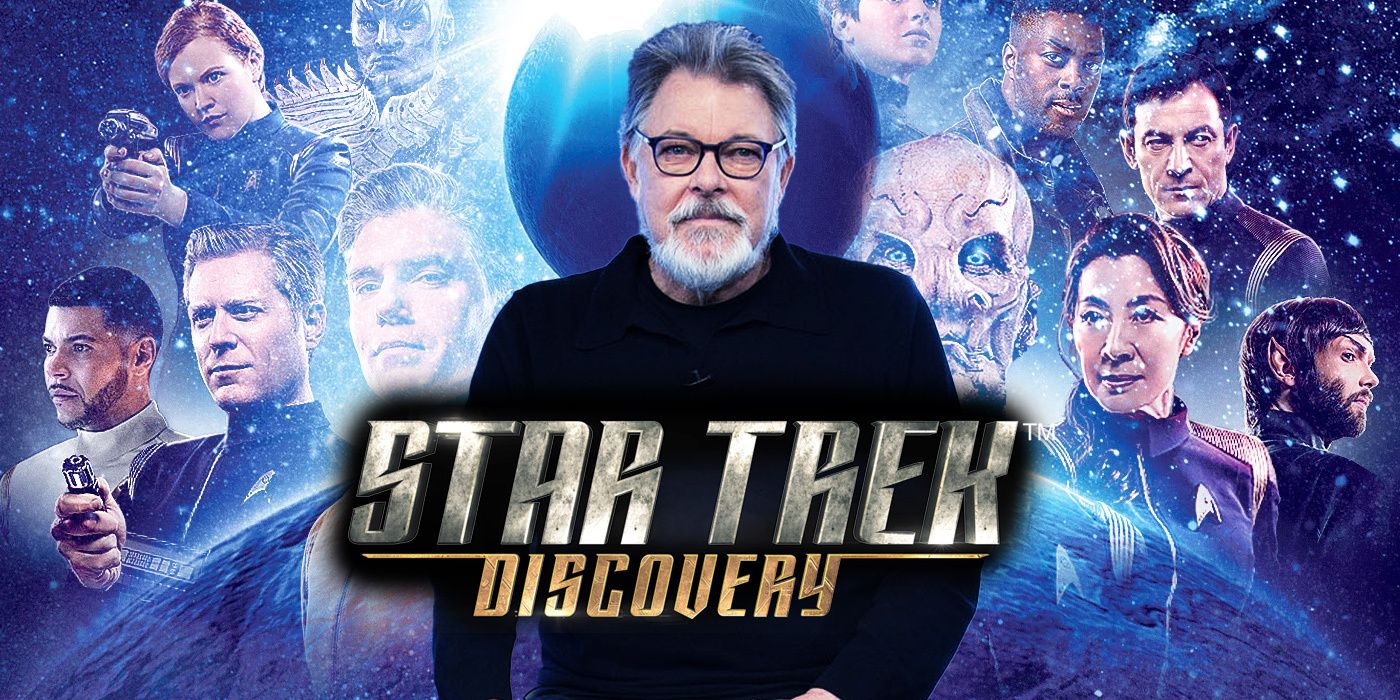
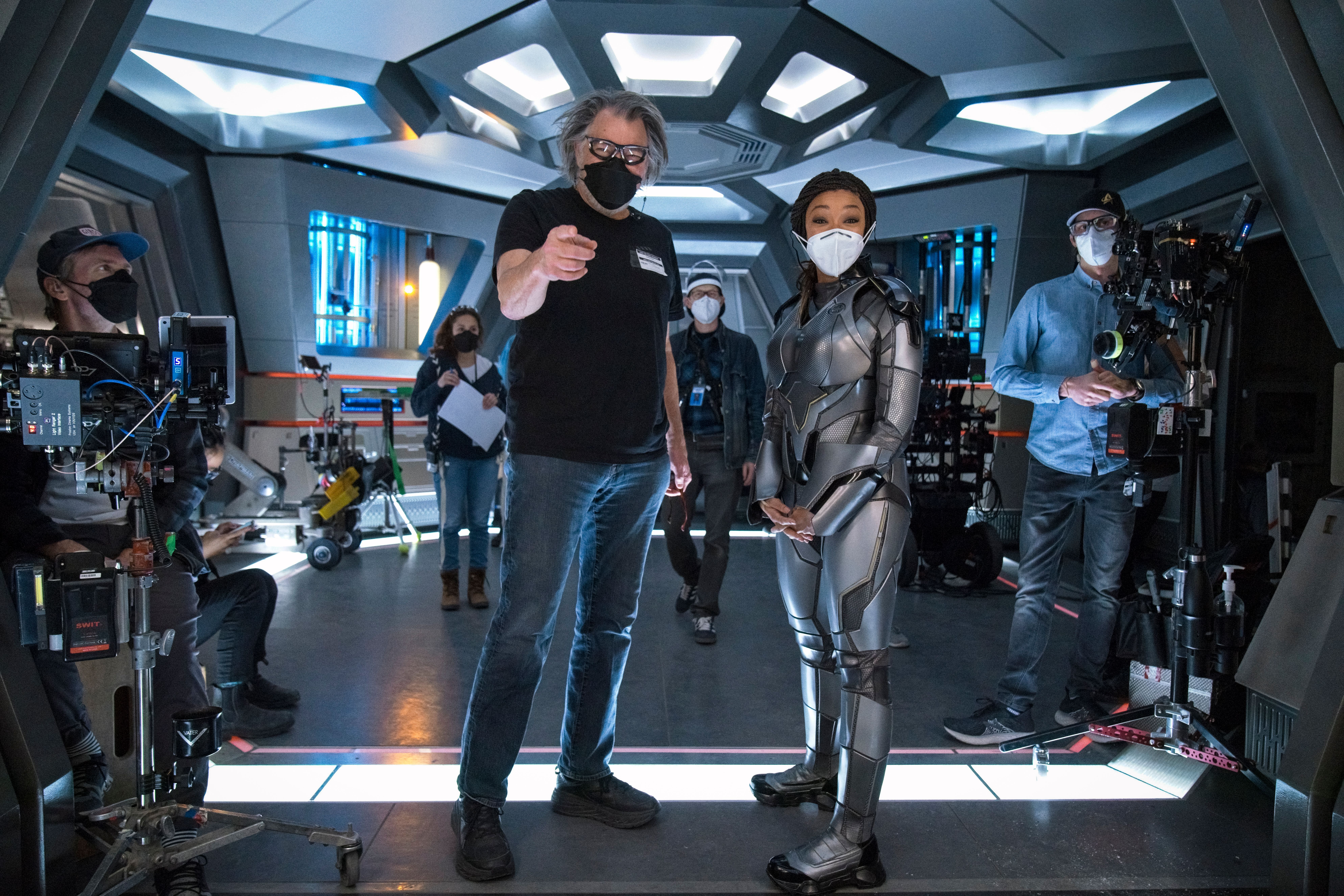
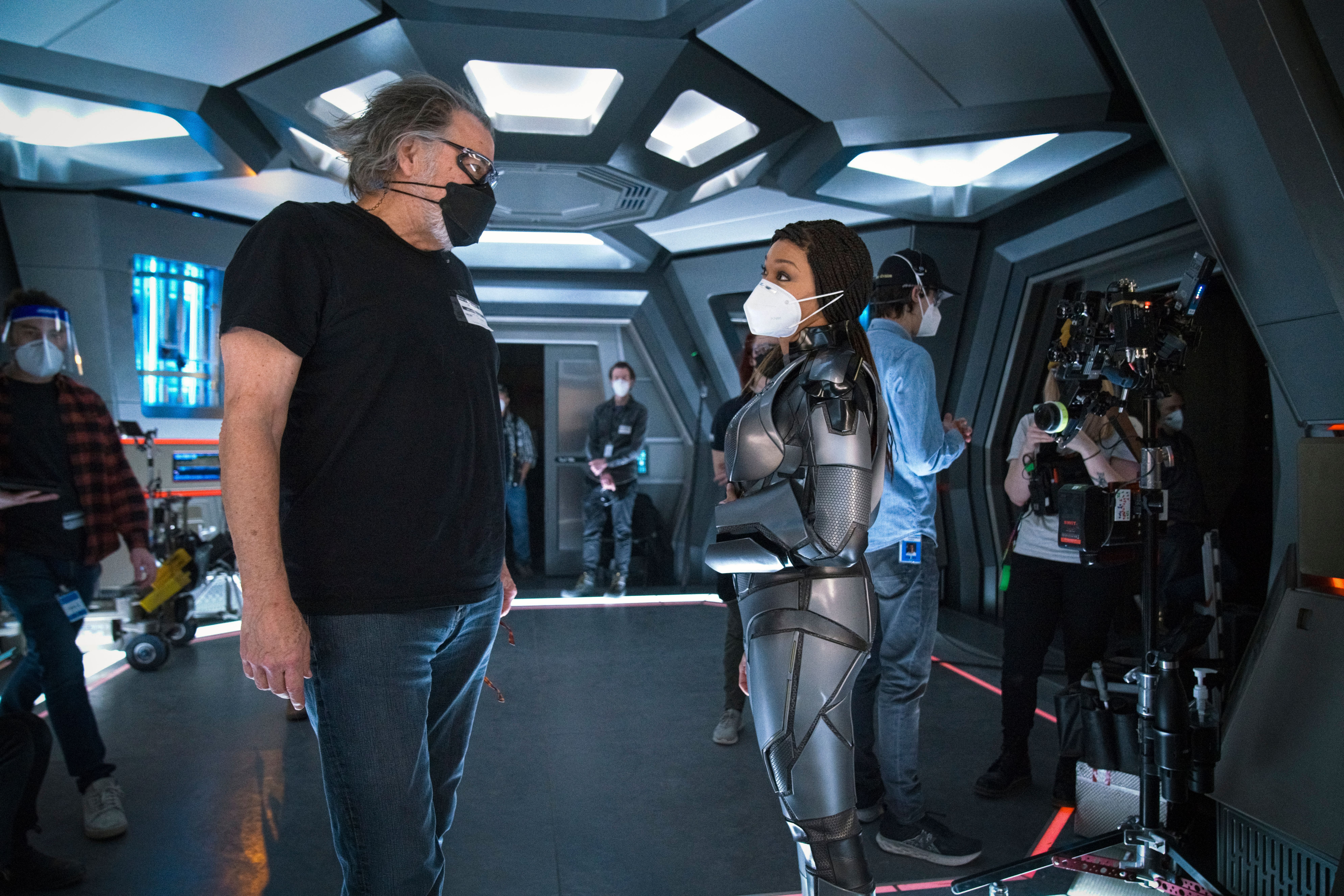
.jpg)
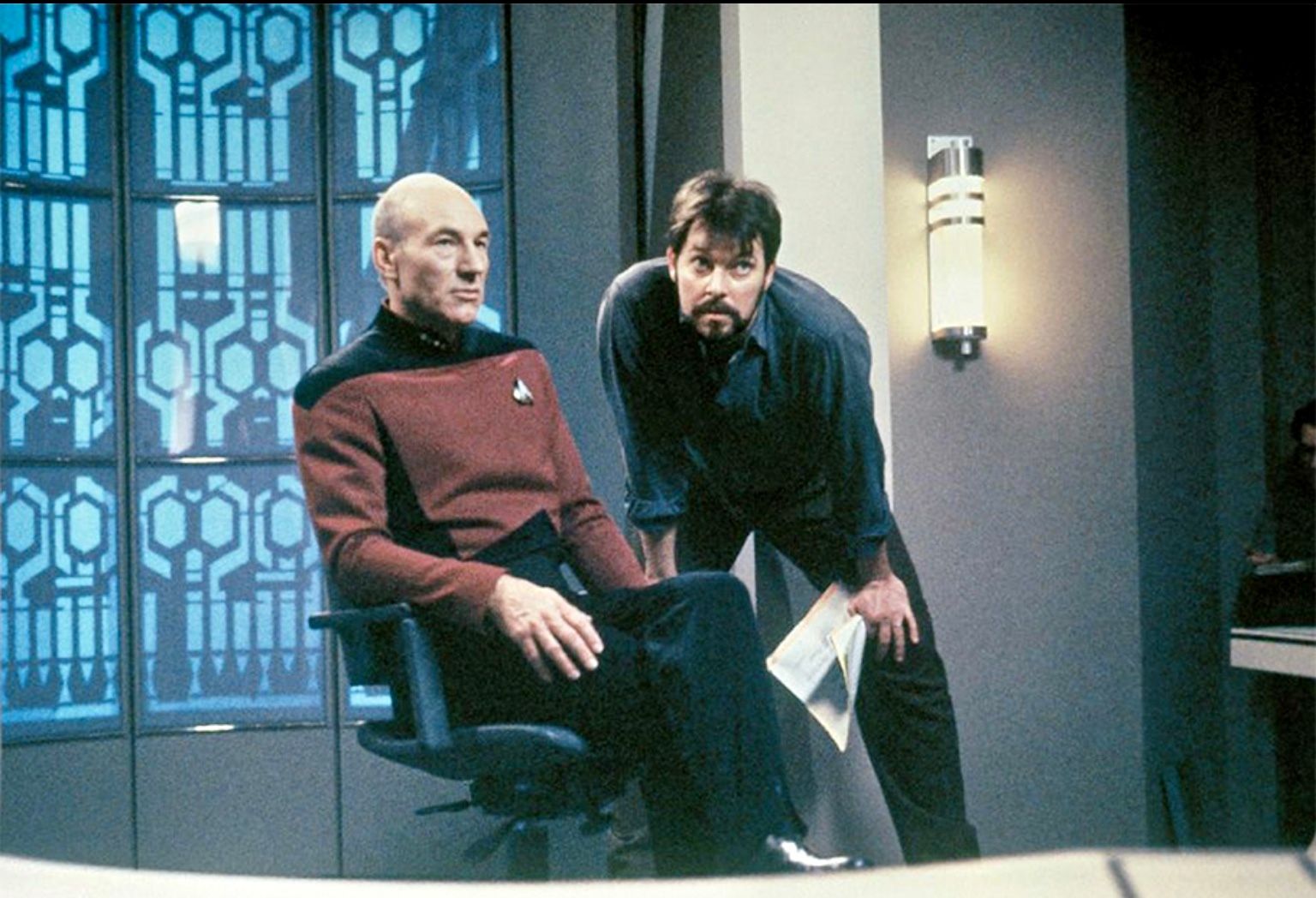
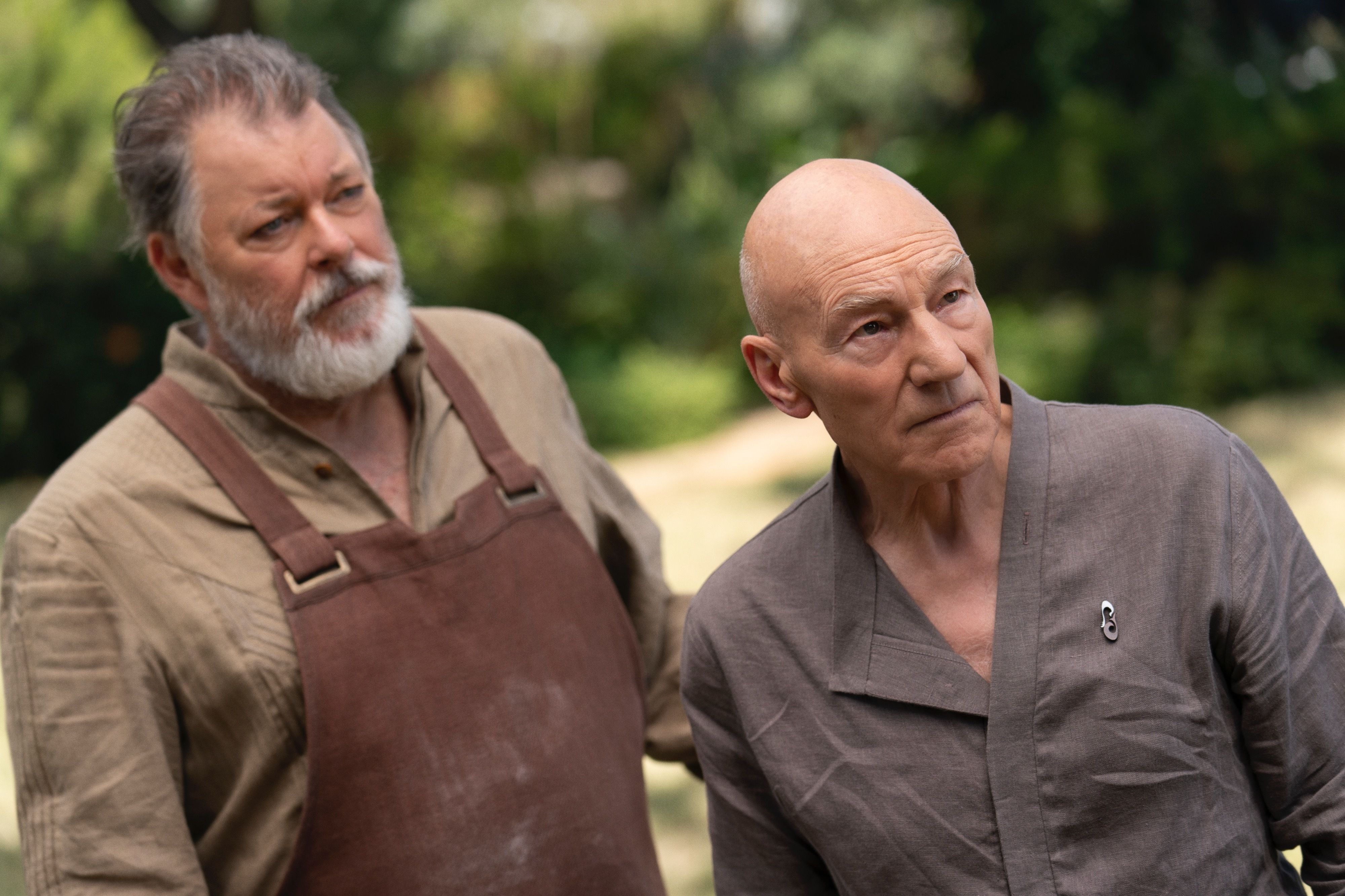
.jpg)
.jpg)
